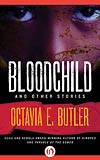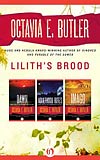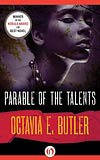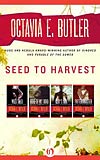WoGF Review: Wild Seed by Octavia E. Butler
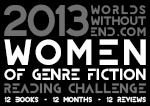 Nadine Gemeinböck (Linguana) has been reading fantasy for as long as she can remember. She started blogging about books on SFF Book Review in 2012, hoping to keep track of what she read and how she liked it. The book blogging community has since helped her open her literary horizons and thanks to WWEnd, she is currently working her way through NPR’s Top 100. Her blogging resolution is to review more foreign language books and finally take the plunge into a big, swooping space opera.
Nadine Gemeinböck (Linguana) has been reading fantasy for as long as she can remember. She started blogging about books on SFF Book Review in 2012, hoping to keep track of what she read and how she liked it. The book blogging community has since helped her open her literary horizons and thanks to WWEnd, she is currently working her way through NPR’s Top 100. Her blogging resolution is to review more foreign language books and finally take the plunge into a big, swooping space opera.
Editor’s Note: This review counts for November.
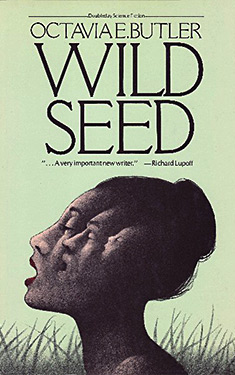 This year’s Women of Genre Fiction Challenge has led me down many new paths. At first, I was only looking for female SFF writers that I hadn’t read before. One name kept coming up: Octavia Butler. Later, especially with events like A More Diverse Universe happening, I looked into SFF writers of color. Again, Octavia Butler was mentioned probably more than anyone else. So, once again, I have the internet hivemind to thank for discovering an amazing writer.
This year’s Women of Genre Fiction Challenge has led me down many new paths. At first, I was only looking for female SFF writers that I hadn’t read before. One name kept coming up: Octavia Butler. Later, especially with events like A More Diverse Universe happening, I looked into SFF writers of color. Again, Octavia Butler was mentioned probably more than anyone else. So, once again, I have the internet hivemind to thank for discovering an amazing writer.
When two immortals meet in the long-ago past, the destiny of mankind is changed forever
For a thousand years, Doro has cultivated a small African village, carefully breeding its people in search of seemingly unattainable perfection. He survives through the centuries by stealing the bodies of others, a technique he has so thoroughly mastered that nothing on Earth can kill him. But when a gang of New World slavers destroys his village, ruining his grand experiment, Doro is forced to go west and begin anew.
He meets Anyanwu, a centuries-old woman whose means of immortality are as kind as his are cruel. She is a shapeshifter, capable of healing with a kiss, and she recognizes Doro as a tyrant. Though many humans have tried to kill them, these two demi-gods have never before met a rival. Now they begin a struggle that will last centuries and permanently alter the nature of humanity.
When I picked up this book, all I knew was that it was going to be the first Octavia E. Butler book I would read and that I liked the cover (my entire basis for choosing this one over her other novels). I didn’t know I would come out at the other end full of emotions and wanting more.
WoGF Review: Imago by Octavia E. Butler
 Rae McCausland (ParallelWorlds) was raised on speculative fiction and dedicated most of her teenage years to the dream of writing fantasy novels. During her college years, her interests shifted toward science fiction thanks to Star Trek and Isaac Asimov’s robot stories. She writes reviews for Parallel Worlds Magazine as a way of building connections between the perspectives of fellow sci-fi nerds and people of marginalized gender and sexual identities.
Rae McCausland (ParallelWorlds) was raised on speculative fiction and dedicated most of her teenage years to the dream of writing fantasy novels. During her college years, her interests shifted toward science fiction thanks to Star Trek and Isaac Asimov’s robot stories. She writes reviews for Parallel Worlds Magazine as a way of building connections between the perspectives of fellow sci-fi nerds and people of marginalized gender and sexual identities.
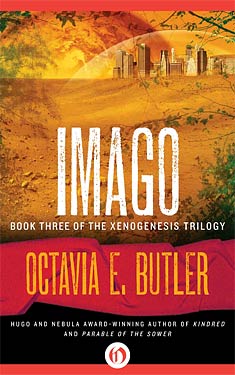 Intended Audience: Adult
Intended Audience: Adult
Sexual content: Significant
Ace/Genderqueer characters: Yes (construct)
Rating: PG-13 for disturbing concepts and some sexual themes
Writing style: 4/5
Likable characters: 4/5
Plot/Concepts: 4/5
Jodahs is ooloi—not male or female. Ooloi are common among the Oankali—the race of aliens which have interbred with humans and saved them from their post-apocalyptic world—but there has never been a human-born ooloi before. Jodahs’ power to assemble and disassemble the genetic structure of things could be the greatest danger Earth has ever known; or it could be the hopeful beginning of a new age and a new species.
Before I get too much further, let me give a disclaimer. Yes, I realized when I picked up Imago that it is the third book in a series, and technically I should have read the first and second book before reading Imago. However, it is a testament to Butler‘s skill that I was able to jump right in to this foreign future Earth and understand what was going on without much trouble. Butler’s dialogue, descriptions, and pacing are all well-balanced…concise, with nothing important left out. The only thing I felt myself lacking was a solid description of what the Oankali look like in terms of similarity or difference to humans. I know that they have tentacles: sensory arms with which they feel and see and smell. They have some kind of head distinguishable from their body, seem to be grey or brown in color and probably stand upright, but I’m not sure beyond that what they really look like. It doesn’t matter that much. Far more fascinating is the way Butler writes them as possessing feelings humans can relate to and yet being quite different in their approach to life. The Oankali are deeply emotional and yet rational—lovers of all life and experience and yet they seem to feel terrifyingly entitled to modify and absorb all forms of life into themselves. I kept expecting this to result in a critique of colonialism, but the Oankali are held up as beautiful and wise beings throughout the story, while humans are a dying species with a genetic flaw which ensures their eventual self-destruction unless the Oankali help them.
WoGF Review: Kindred by Octavia E. Butler
 Jack Dowden (JDowds) doesn’t review Sci-Fi/Fantasy books on his blog 100 Stories 100 Weeks. Instead, he’s set himself the unbelievably naive task of writing 100 short stories in 100 weeks. The results are often disastrous. He came to WWEnd to talk to people about Sci-Fi/Fantasy books though, and is having a wonderful time doing it!
Jack Dowden (JDowds) doesn’t review Sci-Fi/Fantasy books on his blog 100 Stories 100 Weeks. Instead, he’s set himself the unbelievably naive task of writing 100 short stories in 100 weeks. The results are often disastrous. He came to WWEnd to talk to people about Sci-Fi/Fantasy books though, and is having a wonderful time doing it!
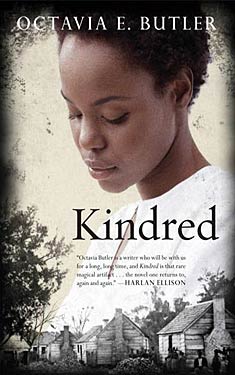 There’s a certain humor that comes with SF, no matter how much we’d like to deny it. Murder… IN SPACE. Religion… IN SPACE. Nazis… IN SPACE. Like heavy metal music, the genre of SF/F can be inspiring and can ask a lot of questions about what it means to be a human, but there’s also a sense of hilarity to it.
There’s a certain humor that comes with SF, no matter how much we’d like to deny it. Murder… IN SPACE. Religion… IN SPACE. Nazis… IN SPACE. Like heavy metal music, the genre of SF/F can be inspiring and can ask a lot of questions about what it means to be a human, but there’s also a sense of hilarity to it.
Not so in Kindred. This book is called Science Fiction, but it isn’t filed under SF and even Butler said she thought it more of a “grim fantasy.” The only thing that makes this SF is the time traveling, and the time traveling isn’t ever explained.
Kindred is a simple story, at least in concept. A black woman, MC, living in modern day Los Angeles (by modern, I mean 1976) with her white husband, is sent back in time – against her own will – to the antebellum south, to a plantation where some of her ancestors are located.
In terms of plot and story structure, this novel obeys all the rules. There’s a gradual increase of tension, character arcs, and some clear plot points.
WoGF Review: Kindred by Octavia E. Butler
 Sue Bricknell (SueCCCP) is an ex-pat Brit living in Maine. She has no real memory of learning to read and has always had a great love of fantasy. She blames this on her early introduction to the Tales of Beatrix Potter, which she had memorized by the age of four. From an early obsession with Fantasy she has expanded her interests into the Science Fiction, Mystery, Horror and Crime genres. Joining a local book group made her realize that she really likes talking about books, so she began her blog, Coffee, Cookies and Chili Peppers. She has recently had the good fortune to be hired as an assistant librarian, so now she can think about books even more!
Sue Bricknell (SueCCCP) is an ex-pat Brit living in Maine. She has no real memory of learning to read and has always had a great love of fantasy. She blames this on her early introduction to the Tales of Beatrix Potter, which she had memorized by the age of four. From an early obsession with Fantasy she has expanded her interests into the Science Fiction, Mystery, Horror and Crime genres. Joining a local book group made her realize that she really likes talking about books, so she began her blog, Coffee, Cookies and Chili Peppers. She has recently had the good fortune to be hired as an assistant librarian, so now she can think about books even more!
 This is one of the few books that I have read that really made me feel the massive differences between American and British history and societal norms. Yes, I grew up knowing about racism in the UK, and I was certainly aware that some people had a real issue with the influx of non-white people in the 1950s. However, the issue of slavery was not as prominent because the vast majority of the African slaves in the British Empire were not actually located in the UK, but in the colonies in the West Indies, for example. When these peoples became free they remained where they were and so did not have to integrate with their previous owners back in Britain. Also, slavery within the UK was made illegal much earlier than in the US and was extended to the whole of the Empire by the Slavery Abolition Act of 1833. All of this makes the British experience very different from that of the US, especially in the Confederate states where much of the action in this novel is based. Similarly, the UK did not suffer from the same racial tensions, segregation and discrimination that led to the civil rights movement of the mid-twentieth century in the US.
This is one of the few books that I have read that really made me feel the massive differences between American and British history and societal norms. Yes, I grew up knowing about racism in the UK, and I was certainly aware that some people had a real issue with the influx of non-white people in the 1950s. However, the issue of slavery was not as prominent because the vast majority of the African slaves in the British Empire were not actually located in the UK, but in the colonies in the West Indies, for example. When these peoples became free they remained where they were and so did not have to integrate with their previous owners back in Britain. Also, slavery within the UK was made illegal much earlier than in the US and was extended to the whole of the Empire by the Slavery Abolition Act of 1833. All of this makes the British experience very different from that of the US, especially in the Confederate states where much of the action in this novel is based. Similarly, the UK did not suffer from the same racial tensions, segregation and discrimination that led to the civil rights movement of the mid-twentieth century in the US.
Octavia E. Butler Comes to eBooks for the First Time
 Octavia E. Butler (1947–2006) was a bestselling and award-winning author, considered one of the best science fiction writers of her generation. Among her many awards she recieved the 1985 Hugo Award for Best Novelette for "Bloodchild" and the 1999 Nebula Award for Parable of the Talents.
Octavia E. Butler (1947–2006) was a bestselling and award-winning author, considered one of the best science fiction writers of her generation. Among her many awards she recieved the 1985 Hugo Award for Best Novelette for "Bloodchild" and the 1999 Nebula Award for Parable of the Talents.
Open Road Integrated Media has created the above video to celebrate their newly launched ebook series of the works of Octavia E. Butler. (More scenes from the documentary are forthcoming.) The 12 volume series covers the bulk of Butler’s books including her Xenogenesis and Patternist series which you can read singly or in their omnibus editions Lilith’s Brood and Seed to Harvest respectively.
From the Open Road site: "Butler was the first African-American woman to come to prominence as a science fiction writer. Published early in her career in small print runs and without much attention, she evolved into a major force in both science fiction and mainstream literature as audiences came to appreciate how her work dealt boldly with such topics as race, religion, gender and social structure."
This is the first time her works have been made available in ebook format and each includes an illustrated biography featuring never before seen photos.
Kindred by Octavia E. Butler
New WWEnd member Grace (BookWithoutPics) is a bibliophile and aspiring librarian who reads a lot of books. She reviews SF/F and other books on her excellent blog Books Without Any Pictures where this review originally appeared. She has shared it with us in honor of Juneteenth.
 If I had to sum up the book in one phrase, I’d say that this book is Murphy’s law applied to time travel. Everything that can go wrong does, and at the worst possible time.
If I had to sum up the book in one phrase, I’d say that this book is Murphy’s law applied to time travel. Everything that can go wrong does, and at the worst possible time.
Kindred is technically classified as sci-fi, but it is a genre-bending novel that also incorporates elements of historical fiction. It tells the story of Dana, a modern black woman from California who is pulled back in time to the early 1800s in Maryland to rescue her distant white ancestor Rufus when his life is endangered. Dana makes six visits to the past during the course of the novel and is only able to return home when she believes that her own life is threatened.
Dana is forced to confront the horrors of slavery as she spends time in the past and struggles with her own identity as she is swept into life on the plantation. Meanwhile, she finds herself in the rather awkward (and completely f’ed up) position of having to make sure that Rufus has sex with a woman named Alice so that her ancestors would be born and she wouldn’t flicker out of existence a la Back to the Future.
Kindred is such a powerful story because Dana is so easy to identify with. She’s intelligent, resourceful, and a very much a product of modern life. When we see slavery from the eyes of someone from our own world it makes everything seem so much more real than it would in a typical historical fiction novel. We see Dana react to the past in a multitude of different ways, ranging from her initial realization that she wasn’t in 1976 anymore when kid-Rufus used a racial slur against her to the panic at realizing that medicine in the early 1800s could be downright scary (bloodletting? leeches? gross!). It’s extreme culture shock on a multitude of different levels, but Dana eventually finds herself adapting and learning to understand the mindset of surviving the violence and dehumanization that her ancestors faced.
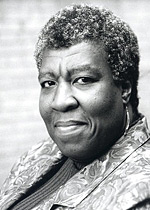 One of the things that I also enjoyed about this book was seeing Dana’s relationship with her husband Kevin. She and Kevin are both writers and are very clearly soulmates. We see some of her backstory with Kevin, including the way that both of their families handled the fact that they were an interracial couple (badly, of course). However, the problems that Dana and Kevin face in the modern world pale in comparison to the harsh reality of life in the 1800s.
One of the things that I also enjoyed about this book was seeing Dana’s relationship with her husband Kevin. She and Kevin are both writers and are very clearly soulmates. We see some of her backstory with Kevin, including the way that both of their families handled the fact that they were an interracial couple (badly, of course). However, the problems that Dana and Kevin face in the modern world pale in comparison to the harsh reality of life in the 1800s.
Dana discovers that anything she’s carrying when she gets pulled into the past goes with her, so she packs herself a bag and on one occasion even takes her husband with her. Kevin tries to use his social standing to protect her, but that doesn’t make Dana’s experience of the past any less dangerous.
I read Kindred in one sitting and was on the edge of my seat the entire time. Octavia Butler‘s writing is articulate and powerful, and she is able to make readers not just see the past but also feel it. Kindred is one of the best books that I’ve ever read, and I’d highly recommend it.



















 Full Details
Full Details
